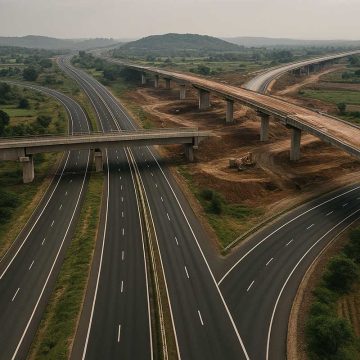Growth will be fuelled by robust economic activity, rising untapped demand, and the easing of capacity constraints at key metros, the ratings agency said. Airport traffic in India is projected to rise from nearly 415 million passengers this fiscal to around 580 million by fiscal 2030, at a compound annual growth rate of 8-9 per...
FlashNews:
India Is Advancing Growth While Preserving Heritage: Sonowal
ISA and IIT Delhi Partner to Build Global Solar Skills
Solar Service Searches Surge 43% Nationwide, Justdial Data Shows
Centre Clears ₹7.97 Billion Green Hydrogen Jetty at Paradip Port
ONGC Hosts 7th Para Games, Championing Inclusion in India Inc.
India’s Space Sector Secures Cyber Shield with CERT‑In, SIA‑India Guidelines
GAIL Breaks Ground on Sohna R&D Centre to Drive Clean Energy Innovation
Veolia Secures 2 Landmark Mumbai Water Projects to Boost Urban Sustainability
Emirates SkyCargo Expands India Freighter Network to Meet Rising Trade Demand
Colliers Maps 30 Industrial & Warehousing Growth Hubs Across India
PAIMANA Portal Tracks ₹39 Trillion Infrastructure Projects in January 2026
Tata Power-Warwick Alliance to Accelerate Energy Systems Innovation
India’s Space Kidz Launches World’s First Space Curriculum for Schools
Road Awards Slowdown to Hit Execution, Intensify Bidding: ICRA
Clean Energy Transition: India’s Global Leadership
Dual Airports to Handle 40 Million Passengers in 2026, Timely Ramp‑Up Crucial: Crisil Ratings
Kazipet Coach Factory Ready for Commissioning as RVNL Completes Core Works
Suzlon Reshapes Leadership: J P Chalasani Elevated, Ajay Kapur Named Group CEO
Noida International Airport Partners Mann Fleet for Seamless Ground Mobility
Tag: Crisil Ratings
India’s Data Centre Revenue to Hit ₹200 Billion By FY2028, Driven by AI, Cloud and 5G: Crisil Ratings
The country’s data centre capacity is projected to double to 2.3-2.5 gigawatts (GW) by March 2028, reflecting buoyant demand across enterprises and consumers, according to a Crisil Ratings study. India’s data centre industry is poised for robust expansion, with operator revenue expected to reach approximately ₹200 billion ($2.4 billion) annually by fiscal 2028. This translates...
Accelerating India’s High-Speed Future
Currently, 22 countries operate high-speed rail or bullet train networks, while another 16 are developing them at various stages of completion. India joined this global movement in 2017 with the launch of its first bullet train corridor on the commercially vital Mumbai-Ahmedabad route. The service was initially expected to begin in 2023, but land acquisition...
Hybrid Growth to Power India’s Rs 3.8 Trillion Clean Energy Surge
Hybrid and storage-backed renewables are set to drive Rs.3.8 trillion in clean energy investments by FY2026-27, powering nearly 40 per cent of new capacity, according to Manish Gupta and Ankit Hakhu. Investment in India’s renewable energy sector is poised to increase at a compound annual growth rate (CAGR) of 55 per cent between this and...
India’s Airline Profitability to Dip Amid Airspace Disruptions and Safety Concerns: Crisil Ratings
However, a rebound is expected in the second half of the fiscal year, with the overall traffic projected to grow by 7-9 per cent, in line with last year’s 8.1 per cent. The Indian aviation sector is expected to witness a moderation in operating profit by 11-14 per cent this fiscal, according to Crisil Ratings....
New HAM Bidding Norms May Sideline 25% of Road Developers, Says Crisil Ratings
India’s Ministry of Road Transport and Highways (MoRTH) introduced the changes on July 10 to curb aggressive bidding and improve construction quality. Revised bidding criteria for hybrid annuity model (HAM) road projects could temporarily disqualify one in four existing developers, according to a new analysis by Crisil Ratings. The Ministry of Road Transport and Highways...
Strengthening Balance Sheets Could Spur Future Growth
The Indian primary steel industry has witnessed a sharp reboundfrom the second half of fiscal 2021despite the challenges posed by the Covid-19 pandemic. While the pandemic-related risks persist, sector analysts at CRISIL Ratingsbelievegrowth momentum for the steel industry could sustain in FY2022. This would help steel makers fortify balance sheets even as they continue to...
Banks Rs.5 trillion NPA worry
The slippages tend to mars banks profitability, but the tide seems to be turning with sharp reduction in SMA 2 cases and better NPA recovery prospects.As much as Rs 5 trillion of bank loans have deteriorated into non-performing assets NPAs in fiscal 2018, taking the total slippages in the past three fiscals to Rs 13 trillion.
Need Rs.26 lakh crore for infra financing
The government will have to undertake a massive provisioning of Rs 26 lakh crore for the next five years to finance infrastructure projects to boost the ´Make in India´
Banks may find it difficult to raise non-equity core capital
Crisil Ratings President Ramraj Pai opined that banks may find it difficult to raise Rs 1.4 trillion worth of non-equity-based tier-I capital, as mandated by Basel III norms, because of complexity involved in these debt instruments. According to Basel III norms, banks will have to raise
1.3 trillion as equity capital and up to Rs 1.4 trillion as non-equity tier-I capital










